French language
![]()
French is a redirect to this article. For other meanings, see French (disambiguation).
French or the French language (proper name (le) français [(lə) fʁɑ̃ˈsɛ], (la) langue française [(la) lɑ̃ɡ fʁɑ̃ˈsεz]) belongs to the Romance group of the Italic branch of the Indo-European languages. Thus, this language is more closely related to Italian, Spanish, Occitan, Catalan, Portuguese, and Romanian, among others.
French is used by about 235 million people every day and is considered a world language, as it is spoken by about 300 million speakers on all continents in over 50 countries and is often learned as a foreign language worldwide. French is an official language in France and its overseas territories, Canada, Andorra, Belgium, Switzerland, Luxembourg, Valle d'Aosta, Monaco, numerous countries in West and Central Africa, and Haiti, among others, while it is widely spoken as a secondary language in Arabic-speaking North Africa and Southeast Asia. It is also an official language of the African Union and the Organization of American States, one of the official languages of the European Union, one of the six official languages and, along with English, the working language of the United Nations, and an official language of the Universal Postal Union. The French language is standardised by the Académie française, the Loi Toubon (a law protecting the French language in France), the Office québécois de la langue française (an authority in Québec), the Service de la langue française (a Belgian institution for the maintenance of the French language) and the Délégation générale à la langue française et aux langues de France.
Distribution
French in Europe
French is spoken in Europe mainly in France itself, but also in large parts of Belgium and Luxembourg, as well as in Western Switzerland and the Valle d'Aosta (Italy). It is also the official language in Monaco.
According to the Eurostat study "Europeans and Languages", carried out between May and June 2005 in the then 25 Member States of the European Union and published in September 2005, 11% of EU citizens speak French as a foreign language. This makes French the third most studied foreign language in Europe after English (34%) and German (12%). According to the study, 12% of EU citizens are native speakers of French.
Alongside German and English, French is the most important official and working language of the European Union. This is partly because France is a founding member of the organisation and many EU institutions are located in the mainly French-speaking cities of Brussels, Strasbourg and Luxembourg. French is also the traditional internal working language of the European Court of Justice, the EU's judicial body, and the Council of Europe. However, within the EU, due to the growing relevance of English, the influence of French on the world of work as a whole is steadily diminishing.
French in the world
French at international level
The French language is considered a world language, it is used on all continents of the world and is the official language of numerous important international organizations. French is still considered the second language of diplomacy, even in a globalized age in which many areas of society are dominated by English.
French is the official or lingua franca of the United Nations, the African Union, the Organization of AmericanStates, the Universal Postal Union (UPU), Interpol, the International Olympic Committee, FIFA, UEFA, the Latin Union, Reporters Without Borders, Médecins Sans Frontières, the World Trade Organization, La Francophonie and many other institutions and organizations.
Role of French in individual countries
In addition to countries where French is an official language, such as France's overseas territories and states in Africa, the Antilles and Oceania, it is spoken as a language of communication and culture in many former colonies of France and Belgium. In the states of the Maghreb, French has been preserved as a language of instruction and culture.
In the United States, French-speaking minorities exist primarily in Maine and Louisiana, and to a lesser extent in New Hampshire and Vermont. See also: French language in the United States.
In the Canadian province of Quebec, the vast majority of people speak French as their first language. Quebec French differs only slightly from standard French in terms of grammar, pronunciation and vocabulary. Smaller French-speaking minorities exist in Ontario, in Alberta, in southern Manitoba, in northern and southeastern New Brunswick/Nouveau-Brunswick (New Brunswick), and in southwestern Nova Scotia (Nova Scotia). Over 20 per cent of Canadians are native speakers of French, and French is an official language on an equal footing with English (see also: Francophone Canadians, French in Canada).
In Mauritius, Mauritania, Laos, Cambodia, Vietnam, Lebanon, the Channel Islands and Andorra, French is used to varying degrees as an educational and administrative language.
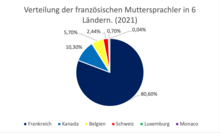
Distribution of native French speakers in 6 countries in 2021.
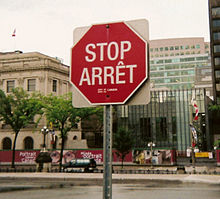
English-French stop sign at the Colline du Parlement in Canada's capital Ottawa
.jpg)
Trilingual sign of the Algerian city of Isser (Arabic, Berber and French)
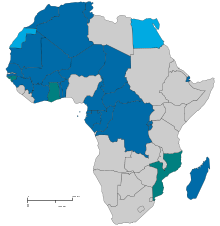
Francophone countries in Africa. The population of these countries was about 431 million in 2019 and is projected to increase to 845 million in 2050. French is the fastest growing language in Africa. Francophone countries in a broader sense. States whose official language is not French but which have joined the International Organisation of La Francophonie.
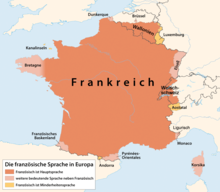
French in France and neighbouring areas
Language variants of the French language
French is an Indo-European language and belongs to the Gallo-Romance languages, which are divided into two groups: the langues d'oïl in northern France and Belgium, and the langues d'oc in southern France.
The status of what is a dialect and what is a language in its own right is disputed. Mostly one speaks of two languages and their respective dialects (in French often called patois). French is assigned to the langues d'oïl and goes back to a dialect from the Île de France, the wider surroundings of the capital Paris.
They are distinguished from the langues d'oc, which are widespread south of the Loire River and constitute a language of their own. The distinction refers to the form for "yes" (oc in the south, < Latin hoc; oïl in the north, < Latin hoc ille). Moreover, the Romance character is stronger in the langues d'oc, which are collectively also called Occitan, while the influence of the Frankish superstrate can be seen in the langues d'oïl.
In addition, there is Franco-Provençal, which is sometimes classified as independent from the other two Gallo-Romance languages. However, since it has not developed a high level language, it is also considered a dialect of the langues d'oc.
The group of Oïl languages usually also includes Jèrriais, a variety on the Channel Island of Jersey, which differs structurally from the mainland varieties due to its isolated geographical location.
In many African countries, French is learned as a second language and is also used as an official language (see also Francophone Africa). In these countries, the language is often characterized by an accent, a specific vocabulary and grammatical as well as pragmatic peculiarities.
Various French-influenced creole languages have also developed from French in the former (mainly Caribbean) colonial territories. However, because of their structure, which differs greatly from standard French, these are usually regarded as a language group in their own right and not as a French variety, such as Haitian.
The circle of Gallo-Romance languages:
- Langues d'oïl (French)
- Gallo, Norman, Frainc-Comtou, Walloon, Picard, Lorraine, Champenois
- Franco-Provençal (Arpitan)
- Langues d'oc (Occitan)
- Provençal, Languedoc, Gascon, Auvergnatic
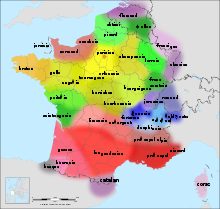
French dialects (yellowish, green and blue shades) and other language groups in France
Questions and Answers
Q: What is French?
A: French is a Romance language that was first spoken in France.
Q: Where is French spoken besides France?
A: French is also spoken in Belgium, Luxembourg, Quebec (Canada), Switzerland, and many different countries in Africa (Francophone Africa).
Q: How many people speak French as a native or a second language?
A: About 220 million people speak French as a native or a second language.
Q: What other language has French been one of the roots of?
A: French has been one of the roots of the Haitian Creole language.
Q: Does French have genders for its nouns?
A: Yes, like the other Romance languages, French's nouns have genders that are divided into masculine (masculin) and feminine (féminin) words.
Q: What is the pronunciation of the French word for "French"?
A: The French word for "French" is "français" and is pronounced "Fronce-eh".
Q: Besides France, what other countries contain French-speaking areas?
A: Belgium (Wallonia), Luxembourg, Quebec (Canada), Switzerland (Romandy) and many different countries in Africa (Francophone Africa) contain French-speaking areas.
Search within the encyclopedia

.svg.png)